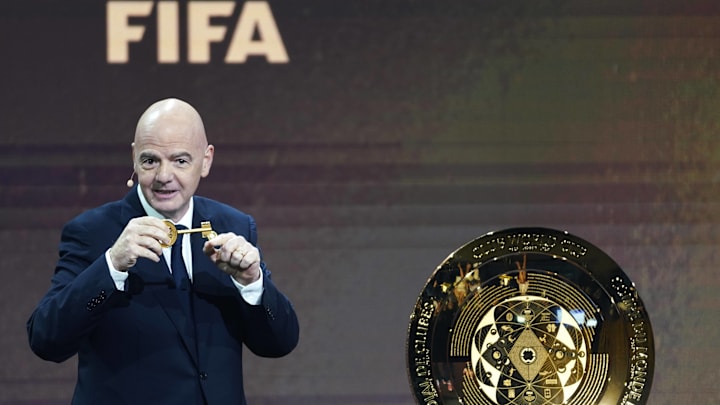Opportunity Knocks for Clubs Not Competing in 2025 FIFA Club World Cup

What a summer we've got ahead of us. FIFA's decision to move to a 48-team World Cup in the United States, Mexico and Canada in 2026 meant a vacancy had opened up. Whatever were we going to do with the tried and tested, incredibly successful 32-team world tournament structure in place since 1998? Replicate it, that's what. Replicate it at club level and watch the world gobble it up. Or force it down the world's throat. Your call.
Thursday saw the draw for the 2025 FIFA Club World Cup take place in Miami. It brought us Donald Trump talking about his pal Gianni (Infantino, FIFA President, "he's the president and I'm the President"), Arsene Wenger's sick dance moves and a group battle of the giants in Manchester City vs. Juventus. Also Bayern Munich vs. Auckland City.
There has always been opportunity in bringing the soccer world together at club level, with the competition's former seven-team format always coming at an awkward time in the European season yet simultaneously offering room for expansion. The problem was always finding the space in the calendar. FIFA has made its decision now, found a way to fund it, announced its distribution and implemented another month's worth of matches in an already packed annual schedule. There's massive upside for South Africa's Mamelodi Sundowns, new Copa Libertadores champion Botafogo, and other clubs from leagues and nations far less well-off to take a slice of the money on offer.
FIFA's big public message in recent years has been to filter that money into parts of the world that need it, continue growth of the global game and, rose-tinted glasses on, the launch of this tournament takes steps to achieving that. Though how big a share of that honey pot goes to everyone remains unconfirmed and there's cynical expectation that the majority will head to the hands of the richest, as is tradition. We won't go into where the money has come from, but hazard a guess if you don't know already.
The global calendar is one of the game's most pressing problems and the next two years will only exacerbate it. It will raise demands on players already pushing through their limits and shorten careers. One of soccer's greatest players of the last decade, Manchester City's Kevin De Bruyne, has been one of the most vocal against the volume of matches in recent years and echoed his sentiments in September, saying, via Reuters: "We know there will be only three weeks between the Club World Cup final and the first Premier League match. So, we have three weeks to rest and prepare for another 80 matches." De Bruyne may yet not take part in the States due to uncertainty over his contract, which expires June 30, but he's not wrong.
De Bruyne will be 34 years old while the tournament is in process from June 15-July 13, and his City club will have played 61 matches in 2020-21, 58 in '21-22, 61 in its treble-winning campaign in '22-23 and 59 last season. The expanded UEFA Champions League format this year, on top of City's qualification to the new competition, means City was likely to hit a similar or greater number this year. The club's early elimination from the EFL Cup softens the blow in exchange for one fewer trophy, but the damage may already have been done. City's physical drop-off in the league has plenty asking questions and De Bruyne has spent, for the second consecutive season, a large chunk of his time recovering from a hamstring injury. De Bruyne remains Belgian national captain too, and he continues to do so despite speculation over international retirement earlier this year.
Modern soccer is increasingly a game for young players. Chelsea's transfer market strategy in recent years may have the club better prepared for its participation next summer, but perhaps the biggest beneficiaries of all are some of the clubs who won't be present, notably from the Premier League.
Liverpool and Arsenal, two clubs competing for the Premier League title, and Rúben Amorim's Manchester United may stand to benefit most. United have some financial difficulties which would have been softened by qualification but the new coach is desperate to create some time to train his players, implement a new system and arrest an expensively assembled squad out of chronic underperformance. Mikel Arteta at Arsenal has held on through the difficult moments to instill identity in his team and time on the training ground separated the two teams on Wednesday, with Arsenal's perfection at the set piece the key reason for winning the night. The Gunners' failure to deliver the big one on the European stage means it stays absent from the Club World Cup, but the right path is being taken. Perhaps the next one beckons in 2029.
Arne Slot's Liverpool fly domestically and sit atop the Champions League group stage, with identity developed on the training pitch under Jürgen Klopp setting the foundation. Slot has fit in seamlessly and built on what worked, reaping the benefits in the first half of the season.
La Liga table-topper Barcelona is conspicuous by its absence, but has proven in the early months of the season under Hansi Flick how impactful time to imprint new tactical instructions can be. Barcelona's well-documented financial troubles would have been greatly aided by qualification, but soccer's endless pursuit of money need not be everything at the top level. So strong is Barcelona's long-established academy line that in times of need, the club can fall back on it to great significance and unearth new stars. Pau Cubarsí, Marc Casado and Lamine Yamal won't feature next summer but are examples of how the answers don't always have to come by chasing cash.
FIFA's new Club World Cup will take center stage at the end of the current season with a World Cup to follow a year later. But the strain on the calendar and its impact on players competing, cutting short their rest periods, opens up a world of opportunity to those not competing. The clubs sitting out the competition can take a head start on those who have succeeded previously and make the right decisions over rest and conditioning for benefit down the line, with the new domestic season slated to start in England on Aug. 16, a month and three days after the final. This is not pockets of players returning from going late into an international tournament, this is entire squads on the back foot for the start of a new campaign. Opportunity knocks.
READ THE LATEST FIFA CLUB WORLD CUP NEWS, PREVIEWS, PREDICTIONS, ANALYSIS AND MORE
manual
